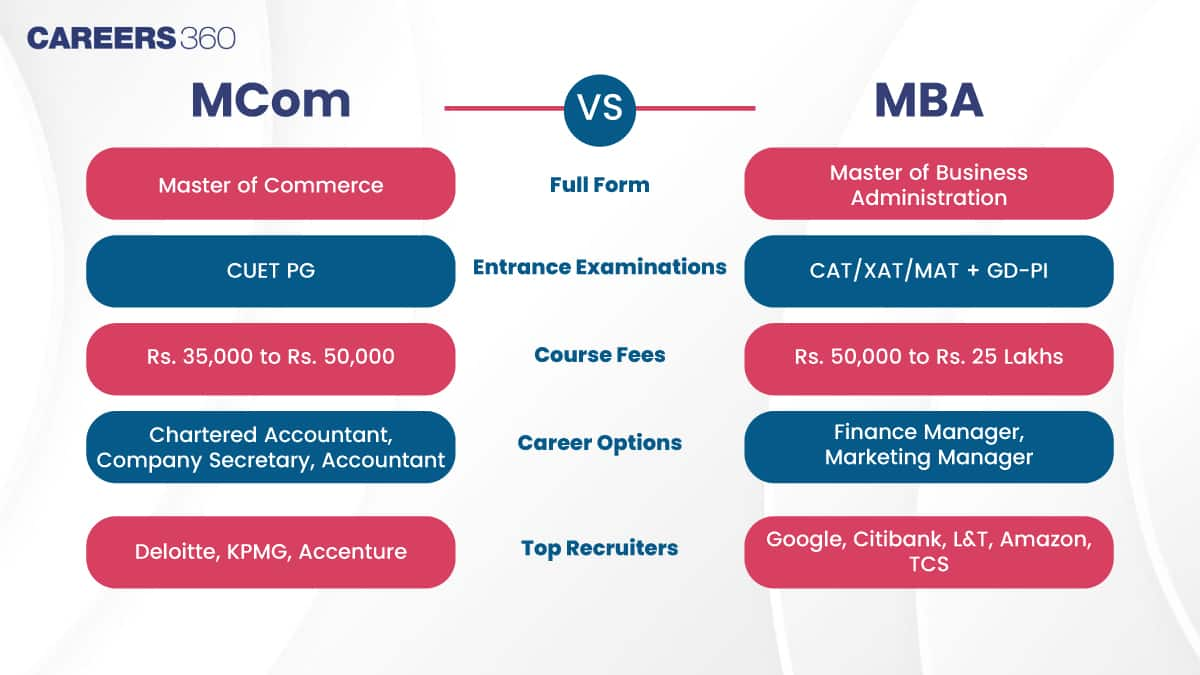RV University, Bangalore | BBA Admissions 2026
Comprehensive 4-year BBA with a 3-year exit option under NEP 2020. Core coverage of Finance, Marketing, Entrepreneurship, Analytics & HR
The major difficulty commerce students face after completing their undergraduate degree is whether to opt for an MCom (Master of Commerce) or an MBA (Master of Business Administration). Both of these degrees are excellent choices for management aspirants, however, some differences set them apart.
This Story also Contains

MBA and M.Com are both postgraduate degrees in the field of management, however, the difference lies in the course curriculum and approach of the two courses. While they may seem similar, MBA programmes focus more on the practical aspects and experiential knowledge of the concepts. M.Com is more on the theoretical side. Management degree aspirants can choose from both of these degrees, however, the scope and career aspects may be different.
MBA and M.Com are amongst the most popular postgraduate degrees pursued by management aspirants. In this article, we will learn about both of these degrees in detail, their similarities and differences, benefits, scope, career opportunities, and fee details.
Master of Business Administration or MBA is a popular professional degree in the field of management. It is generally of two-year duration, spread across six semesters. It has long been recognised as one of the highest-paying degrees in the world. It provides students with advanced knowledge of business and managerial concepts, along with good practical knowledge. After graduation, students can apply for many medium to senior-level job roles and earn good salary packages.
Master of Commerce, popularly known as MCom is another promising management degree. The course duration is also similar to an MBA, which is two years. The course curriculum provides in-depth knowledge of subjects such as commerce, finance, management, and economics. Unlike an MBA, an M.Com degree is generally focused more towards a theoretical understanding of the concepts.
After their under graduation, many students are confused about whether to choose an MCom or an MBA degree. The difference lies in their approach to education. While an MBA focuses on providing broader business knowledge and skills, an M.Com specialises in a specific field of management, which is commerce. In the table below, we have provided a comparison of both degrees.
Particulars | MCom | MBA |
|---|---|---|
Full Form | Master of Commerce | Master of Business Administration |
Degree Level | Postgraduate | Postgraduate |
Eligibility Criteria | Bachelor’s degree from a recognised institute in India | Bachelor’s degree from a recognised institute in India |
Admission Process | Entrance exam+GDPI | Entrance exam+GDPI |
Fees (for the entire duration) | Rs. 35,000 to Rs. 50,000 | Rs. 50,000 to Rs. 25 Lakhs |
Job Profiles | Chartered Accountant, Company Secretary, Accountant, Business Analyst, Investment Banker | Finance Manager, Marketing Manager, HR Manager, Business Analyst, Sales Manager |
Top Recruiters | Deloitte, KPMG, Accenture, HDFC Bank, ICICI Bank, Bain and Company | Google, Citibank, ITC, Larsen and Toubro, Amazon, Wipro, TCS |
As per the table above, it is clear that an MBA is an expensive degree as compared to an M.Com. However, the return on investment is also on the higher side. The admission process and eligibility criteria for both degrees are very similar.
It is very difficult to decide which of these two degrees is better. Both of these degrees provide a promising and high-paying career. However, there are some major points to consider before pursuing each of these degrees. Listed below are some of the key aspects of these degrees.
In the table below we have discussed the average salary of some of the popular career opportunities after MCom and MBA. Students should decide on the job role as per their preferences and future aspirations.
Job Profiles | Average Salary |
|---|---|
Business Analyst | Rs. 9.8 LPA |
Marketing Manager | Rs. 12.7 LPA |
Human Resource Manager | Rs. 4.4 LPA |
Finance Manager | Rs. 17 LPA |
| Job Profile | Average Salary |
|---|---|
Chartered Accountant | Rs. 10.7 LPA |
Company Secretary | Rs. 9.3 LPA |
Accountant | Rs. 3.21 LPA |
To conclude, it is very difficult to judge which degree is better, it depends on the individual preferences, and their future goals and preferences. Candidates are advised to check all the course details before applying for admission. Both MBA and MCom are promising choices, however, both have their own pros and cons.
On Question asked by student community
Hello
If you are looking to take admission in the MBA programme with a CAT score of 73, check out the list of MBA Colleges accepting 70-80 percentile .
All the best!
Hello, you can get the best colleges for online MBA here. Many top Bschools today also provide online MBA programmes including IIM Ahmedabad, IIM Bangalore, and XLRI Jamshedpur.
There are several government and private colleges in India offering UGC-recognised Online MBA. Some of which are as follows:
Here are some useful article links for more read :
UGC Approved Online MBA Colleges in India 2026: Complete List, Fees,
At any institute, 100% placement is not guaranteed for every student. Students' placement depends on their academic performance, interview skills, and the specialisation they choose.
Check the link below to know about the DEI placement statistics:
https://www.careers360.com/university/dayalbagh-educational-institute-agra/placement
Ranked among top 10 B-Schools in India by multiple publications | Top Recruiters-Google, MicKinsey, Amazon, BCG & many more.
Among top 100 Universities Globally in the Times Higher Education (THE) Interdisciplinary Science Rankings 2026
Application Deadline: 10th March | Globally Recognized by AACSB (US) & AMBA (UK) | 17.8 LPA Avg. CTC for PGPM 2025
Industry Internship Training
NAAC A++ Accredited | Ranked #12 by NIRF
Last Date to Apply: 28th Feb | Ranked #36 amongst institutions in Management by NIRF | 100% Placement